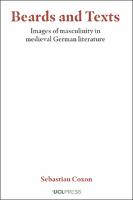Beards and Texts
Images of masculinity in medieval German literature

Download Url(s)
https://library.oapen.org/bitstream/20.500.12657/51822/1/9781787352216.pdf---
https://library.oapen.org/bitstream/20.500.12657/51822/1/9781787352216.pdf
---
https://library.oapen.org/bitstream/20.500.12657/51822/1/9781787352216.pdf
---
https://library.oapen.org/bitstream/20.500.12657/51822/1/9781787352216.pdf
Author(s)
Coxon, Sebastian
Language
EnglishAbstract
Beards and Texts explores the literary portrayal of beards in medieval German texts from the mid-twelfth to the early sixteenth centuries. It argues that as the pre-eminent symbol for masculinity the beard played a distinctive role throughout the Middle Ages in literary discussions of such major themes as majesty and humanity. At the same time beards served as an important point of reference in didactic poetry concerned with wisdom, teaching and learning, and in comedic texts that were designed to make their audiences laugh, not least by submitting various figure-types to the indignity of having their beards manhandled. Four main chapters each offer a reading of a work or poetic tradition of particular significance (Pfaffe Konrad’s Rolandslied; Wolfram von Eschenbach’s Willehalm; ‘Sangspruchdichtung’; Heinrich Wittenwiler’s Ring), before examining cognate material of various kinds, including sources or later versions of the same story, manuscript variants and miniatures and further relevant beard-motifs from the same period. The book concludes by reviewing the portrayal of Jesus in vernacular German literature, which represents a special test-case in the literary history of beards. As the first study of its kind in medieval German studies, this investigation submits beard-motifs to sustained and detailed analysis in order to shed light both on medieval poetic techniques and the normative construction of masculinity in a wide range of literary genres.

